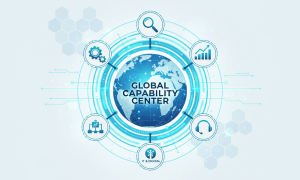Outsourcing has been the talk of the town in boardrooms across the world. It has been the champion of cost-cutting and the go-to strategy for tapping into a global talent pool without the headache of a full-scale global expansion. But the world has changed. The game is no longer about only cutting costs; it’s about building something of value, driving innovation, and owning your global footprint. This is where a Global Capability Center comes in handy.
What Exactly is a Global Capability Center?

Although the name might sound intimidating, a GCC (Global Capability Center) is the next step in the natural evolution of outsourcing. Let’s put it this way; instead of renting a car, you get to build a state-of-the-art vehicle that meets all your requirements and fits into your business like a piece of jigsaw puzzle. It’s not a fancy name for outsourcing too. It’s actually a fundamental shift in thinking as it moves from delegating tasks to building a fully functional extension of your own company in another part of the world. And India is the best place to build one.
This does not mean that outsourcing is completely done for. It still has its own place. But forward-thinking global enterprises are realizing that for their most critical operations, they need more than a contractor; they need a dedicated, integrated team. They need a GCC.
From a Rented Workforce to a Global Team: The Core Difference
At its core, the biggest difference between outsourcing to India and setting up a Global Capability Center in India comes down to a simple thing – ownership.
With traditional outsourcing you’re handing over a piece of your business to an outsourcing company. You give them a set of tasks, and they deliver the results. You then pay the invoice. This process is purely transactional. Although it is efficient, it comes with inherent limitations. You have limited control over the people doing the work, the culture they’re a part of, and their long-term skill development.
A Global Capability Center, on the other hand, is a dedicated entity that exists within the realms of your own company. The people in your GCC are your employees. They are an integral part of your team, steeped in company culture and working towards your strategic goals. It moves well beyond a client-resource relationship while you distribute your capabilities across the globe.
What does that look like for you?
You can outsource your work by hiring a freelance content writer to write a few blog posts for you every week. The relationship is purely transactional. Or you can set up an entire division (GCC) in a different country that is full of talented writers and editors. While the first option of outsourcing is a good short-term solution for a specific need, the second option of opening up a GCC is a long-term investment in your company’s growth and capabilities.
Why Open a Global Capability Center in India?
India has been at the centerstage of the outsourcing boom for decades. Now, it has also become the undisputed global leader for GCCs. Although there are several factors at play that make Indian Global Capability Center Consulting a lucrative growth opportunity, the most common ones are:
- A Deep Talen Pool – India has one of the youngest populations in the whole world. This means that the talent pool is wide. However, it’s the depth of the talent pool that matters here. With over a million new graduates every year, India also houses world-class software engineers, data scientists, marketers, and R&D specialists. A Global Capability Center in India isn’t just a back-office support center. It can be the hub of innovation.
- Beyond Service Mindset – India is currently experiencing a massive shift from the service mindset to a mindset of ‘psychological ownership.’ The new working class are keen to do more than just take orders and execute tasks. They are hardwired to think like founders. This kind of ‘intrapreneurial’ culture means they are always pushing for better solutions and treat your product like their own.
- The Government rolls out the Red Carpet – The growth of GCCs in India isn’t some happy accident the government is ignoring. It’s a deliberate part of the national strategy, and they are actively sweetening the deal to ensure the biggest companies in the world set up shop here. For instance, entities setting up in designated Special Economic Zones (SEZs) get a raft of benefits, including streamlined clearances and tax holidays. Furthermore, the new corporate tax rates are one of the most competitive rates in Asia.
Why a GCC is Non-Negotiable in Today’s World
With 2026 on the horizon, the world is more connected and competitive than ever. This makes having a Global Capability Center (GCC) a must-have; not a ‘nice-to-have.’
- The Talent War – The “war for talent” isn’t just about finding skilled people; it’s about accessing entirely new pools of them. While your competitors are fighting over the same expensive engineers in Silicon Valley or London, a GCC gives you a strategic backdoor to a massive, world-class talent market. You’re not just hiring employees; you’re building a sustainable talent engine in a region where you can attract the best and brightest, creating a long-term competitive advantage that’s nearly impossible to replicate in your home market.
- Moving at the Speed of the Market – A centralized headquarters can quickly become a bottleneck, slowing down decisions and killing momentum. A GCC acts as a powerful, semi-autonomous hub that can move at the speed of its local market. It empowers your global teams to innovate, execute, and respond to opportunities without waiting for a dozen approvals from a time zone nine hours away. This creates a more agile, resilient organization that can outmaneuver slower, more centralized competitors.
- Insourcing Your Most Valuable Asset – In the age of AI, your most critical intellectual property isn’t just your code; it’s your customer data. Outsourcing this to a third party is like giving a stranger the keys to your entire kingdom. A GCC allows you to keep your data, analytics, and the resulting AI development securely in-house. You maintain absolute control over your most valuable asset, ensuring that the insights and competitive advantages derived from it belong to you and you alone.
You can’t Do it All by Yourself
The decision to finally set up a Global Capability Center in India is the right one. However, you cannot take this lightly. Simply adopting a “lift-and-shift” approach, where you move your existing operations to a new location can quickly end in failure. Without a well-defined Global Capability Center operating model, you will be flying blind.
The process can be complex and time-consuming, which is why many businesses choose to partner with a Global Capability Center advisory firm like Remote Resource. We help you navigate the legal landscape, understand the cultural nuances, and execute a successful GCC strategy.
For businesses looking to not just survive but thrive in 2025 and beyond, establishing a Global Capability Center in India is no longer an option. It’s a necessity.



